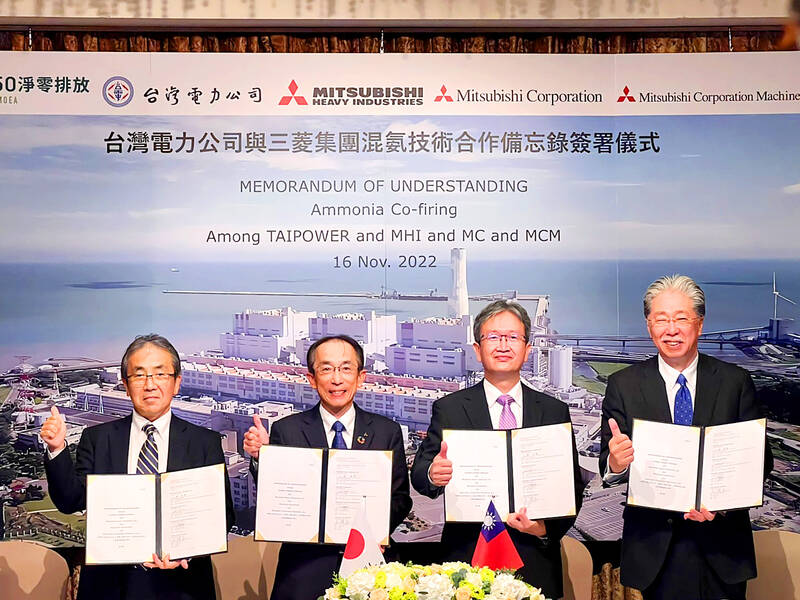State-run utility Taiwan Power Co (Taipower, 台電) yesterday signed a memorandum of understanding (MOU) with Japan’s Mitsubishi Group to conduct a demonstration project that involves mixing ammonia with coal to generate power at the Linkou Power Plant (林口發電廠) in New Taipei City.
The project aims to achieve 5 percent cofiring of ammonia at the coal-fired plant by 2030 before increasing the use of ammonia to 20 percent, Taipower spokesman Wu Chin-chung (吳進忠) said.
If the 5 percent ammonia cofiring target is reached, it is expected to help the power plant reduce its carbon emissions by 9,000 tonnes per year, Taipower said.

Photo: Lin Jin-hua, Taipei Times
Emissions reduction in the power sector plays an important role in Taiwan’s efforts to reach its goal of net zero emissions by 2050.
Taipower continues to promote a coal-to-gas shift at coal-fired plants — which includes burning ammonia with coal — energy storage technologies and sources of renewable energy, Taipower president Wang Yao-ting (王耀庭) said during the signing ceremony.
Toshiyuki Hashi — chief executive officer of gas power at Mitsubishi Hitachi Power Systems Ltd, a power solutions brand — said that Taiwan and Japan face common challenges in fuel imports and development of renewable energy sources, adding that he believes through collaboration, the two countries can effectively foster and accelerate an energy transition.
Hiroki Haba, chief operating officer at Mitsubishi Corp’s Next Generation Fuels & Petroleum business division, said that the group plans to spend ¥1.2 trillion (US$8.6 billion) to develop next-generation energy technologies.
As part of that approach, Mitsubishi Corp is seeking to make the ammonia-coal cofiring technology used in the demonstration project with Taipower more cost competitive, Haba said.

NEW IDENTITY: Known for its software, India has expanded into hardware, with its semiconductor industry growing from US$38bn in 2023 to US$45bn to US$50bn India on Saturday inaugurated its first semiconductor assembly and test facility, a milestone in the government’s push to reduce dependence on foreign chipmakers and stake a claim in a sector dominated by China. Indian Prime Minister Narendra Modi opened US firm Micron Technology Inc’s semiconductor assembly, test and packaging unit in his home state of Gujarat, hailing the “dawn of a new era” for India’s technology ambitions. “When young Indians look back in the future, they will see this decade as the turning point in our tech future,” Modi told the event, which was broadcast on his YouTube channel. The plant would convert

‘SEISMIC SHIFT’: The researcher forecast there would be about 1.1 billion mobile shipments this year, down from 1.26 billion the prior year and erasing years of gains The global smartphone market is expected to contract 12.9 percent this year due to the unprecedented memorychip shortage, marking “a crisis like no other,” researcher International Data Corp (IDC) said. The new forecast, a dramatic revision down from earlier estimates, gives the latest accounting of the ongoing memory crunch that is affecting every corner of the electronics industry. The demand for advanced memory to power artificial intelligence (AI) tasks has drained global supply until well into next year and jeopardizes the business model of many smartphone makers. IDC forecast about 1.1 billion mobile shipments this year, down from 1.26 billion the prior

People stand in a Pokemon store in Tokyo on Thursday. One of the world highest-grossing franchises is celebrated its 30th anniversary yesterday.

Zimbabwe’s ban on raw lithium exports is forcing Chinese miners to rethink their strategy, speeding up plans to process the metal locally instead of shipping it to China’s vast rechargeable battery industry. The country is Africa’s largest lithium producer and has one of the world’s largest reserves, according to the US Geological Survey (USGS). Zimbabwe already banned the export of lithium ore in 2022 and last year announced it would halt exports of lithium concentrates from January next year. However, on Wednesday it imposed the ban with immediate effect, leaving unclear what the lithium mining sector would do in the